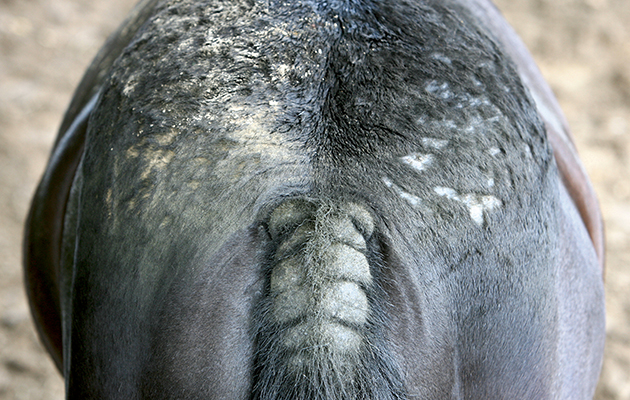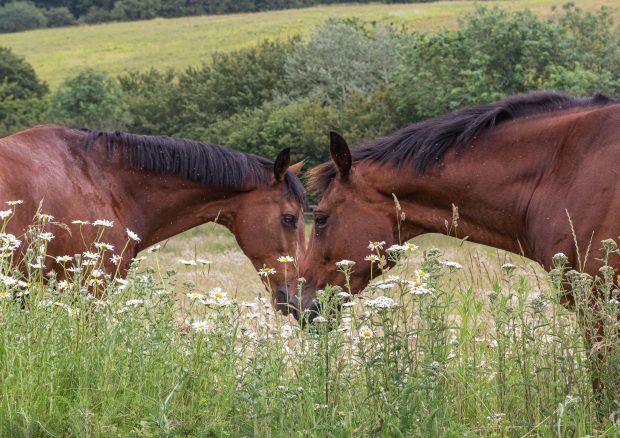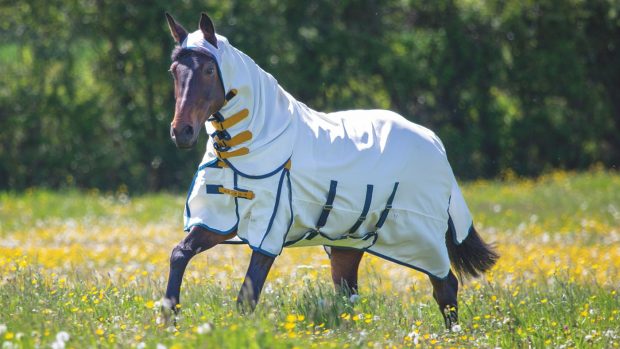With many owners battling sweet itch this summer, Rachel Fraser speaks to equine vet Dr Francesca Compostella, RSPCA equine senior clinician, to dispel some sweet-itch myths and find out how to best manage the condition.
There’s a common thought that sweet itch only affects ponies, is this true or can it affect any equine, of any age?
“Sweet itch is a common term to refer to ‘insect hypersensitivity’ or bluntly said: allergy to insect bites, in particular to bites of Culicoides spp midges” explains Dr Compostella.
“It can affect any equine, of any age, breed and sex. However, as it is an allergic reaction, it gets worse with repeated exposures (just as in human allergy cases). It is thereby most obvious and severe in older animals, which have been exposed to the insect bites every summer.
“This type of allergic reaction recruits a specific type of white blood cell in the body called eosinophil. It is possible that the speed and degree of recruitment of these cells may differ between ponies and horses, as it is likely to do after repeated exposures explaining why older animals seem to be most affected.
“If a horse is genetically predisposed to the allergy, it will affect them regardless, following exposure to the insect bite.”
What are the best ways to manage sweet itch?
“The best cure is prevention. Avoiding lowland areas near stagnant water, with large bushy patches is paramount” advises Dr Compostella.
“Animals affected should be kept covered with fly rugs and insect repellents used daily. Among insect repellents, those containing pyrethroids have been proven to be most efficient offering up to 2 week efficacy against culicoides, and rugs could be soaked in such repellents for maximum effect.
“Avoid turnout in times when midges are most active and preferably choose a windy, dry field. Mosquito nets can be placed on the stable walls and fans to keep the airflow and stop the midges being able to land on the horse.
“Immunotherapy to stop the inflammatory reaction are being looked into, but will require a bit longer to perfect and become commercially available.
“Anti-histamines can be beneficial in some mild cases, but in most severe and acute ones you may need to contact your vet which will treat the reaction to relieve the inflammation – commonly with a dose of steroids. This type of treatment however carries side risks, such as triggering laminitis, and should not be used lightly.
“Prevention is by far the best cure.”
Is the cause of sweet itch known?
“Yes” says Dr Compostella, “It is due to a reaction to proteins contained in the saliva of midges, which trigger an inflammatory reaction in the horse.
“This reaction can be really acute – Type 1, within 6 hours – or delayed, Type 4, within a few days. They are all characterised by skin lumps filled with serum (fluid), which cause itchiness and can spontaneously break the skin or cause lesions as the horse rubs them.”
Continued below…
You might also be interested in:

10 ways to beat sweet itch this summer

Subscribe to Horse & Hound magazine today – and enjoy unlimited website access all year round

7 rugs to help protect horses who are prone to sweet itch
Can sweet itch be passed on to offspring, should horses with sweet itch be bred from?
“There is a risk in breeding from affected animals as a horse is genetically predisposed to react to the insect bite” Dr Compostella explains.
“However the disease is only triggered by environmental factors (the midges) so you could breed a top quality horse and keep it in a midge free area during the summer months and never have to treat the condition.
“It is a calculated risk that should be carefully considered however, as the disease has a noticeable effect on the welfare of the animal if not managed appropriately.”
For all the latest equestrian news and reports, don’t miss Horse & Hound magazine, out every Thursday



